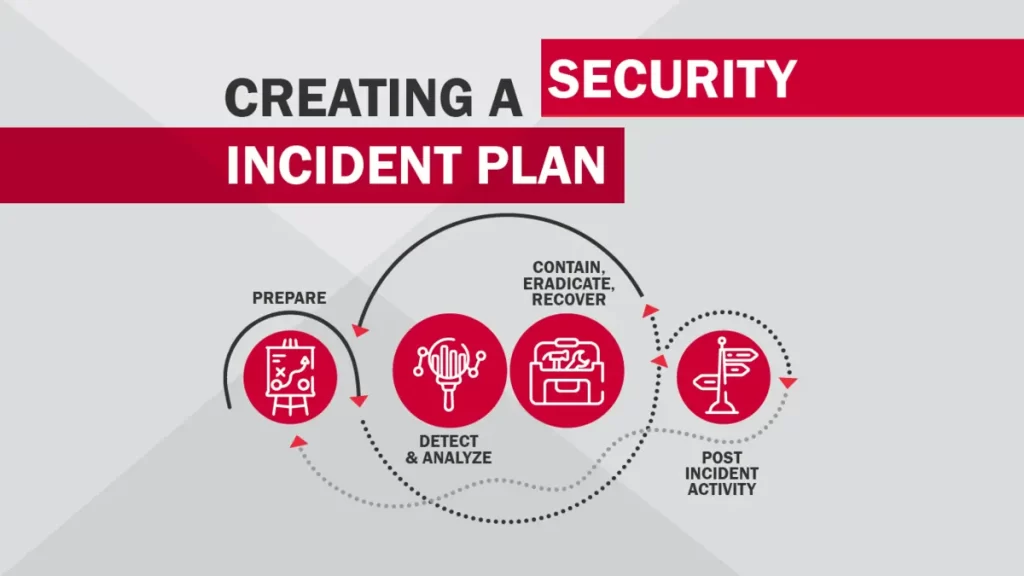Digital Transformation and Innovation (DTI) courses are professional development courses designed for graduate students, academics, and business professionals and focus on equipping learners with the necessary skills and knowledge foundations for succeeding in today’s knowledge society.
IT Career Planning
IT career paths – everything you need to know
How to plan, kick-start, and level up your IT career: job roles, job titles, specializations, skills, certifications, salaries, and training resources, from entry level positions to senior level positions.
Job roles in IT and cybersecurity
An exploration of in-demand job roles in IT and cybersecurity covering job responsibilities, skills, and certifications for the roles of System Administrator, Network Administrator, Incident Responder, Penetration Tester, Cloud Engineer, Cybersecurity Manager, and Privacy Analyst.
How to break into information security
A look into the foundation areas of information security and key career routes for information security analysts with practical advice and training resources.
The Security Operations Center (SOC) career path
A dive into the Security Operations Center (SOC) career path – technologies, SOC team member roles, responsibilities, skills/qualifications, certifications, and training resources.
The GRC approach to managing cybersecurity (the GRC Analyst)
Demystifying Governance, Risk Management, and Compliance (GRC) – a thorough discussion of the GRC cybersecurity career path – focusing on the role of the GRC analyst/manager.
An overview of key practices, responsibilities, and job roles of professional ethical hackers.
How to become a Cisco Certified Network Associate – a one stop shop for passing your CCNA 200-301 exam (Implementing and Administering Cisco Solutions).
Governance, Risk Management, and Compliance (GRC)
Information security definition
An expansive definition of information security is synthesized to situate the technical, theoretical, and regulatory context of ethical hacking applications in enterprise IT governance.
Compliance frameworks and industry standards
The background needed to understand the key cybersecurity compliance frameworks and industry standards recommended or required for organizations to implement to protect critical data.
The GRC approach to managing cybersecurity
Demystifying Governance, Risk Management, and Compliance (GRC) – a thorough discussion of the GRC cybersecurity career path – focusing on the role of the GRC analyst/manager.
Ethical AI frameworks, initiatives, and resources
A literature review of ethical AI frameworks for the design and governance of AI systems and a pragmatic framework and approach for the ethical design of AI systems based on my uOttawa PhD in DTI thesis (2020).
IT governance and cybersecurity regulations
A discussion of the steps of the information security risk-based management approach and its place in enterprise IT governance. Important IT governance frameworks and cybersecurity regulations and standards are also discussed.
Network security risk mitigation best practices
A discussion of network layers within the OSI model and the TCP/IP model in the context of vulnerability and mitigation.
Computer Networking
How data flow through the Internet (Networking Fundamentals)
After completing this module, you will be able to explain what happens when someone types www.google.com into a web browser.
Network security risk mitigation best practices
A discussion of network layers within the OSI model and the TCP/IP model in the context of vulnerability and mitigation.
How to become a Cisco Certified Network Associate – a one stop shop for passing your CCNA 200-301 exam (Implementing and Administering Cisco Solutions).
Key CCNA terms and concepts. A CCNA glossary for Cisco IT professionals.
An evolving, growing assortment of CCNA 200-301 study material I am maintaining and developing as I walk through my journey to CCNA certification.
Foundations in Ethical Hacking
Ethical assessment of teaching ethical hacking
A theoretically and empirically grounded analysis of the risk to society of teaching university students hacking skills. Pragmatic policy statements represent recommendations to mitigate the risk of teaching higher education students hacking skills.
The ethical teaching of ethical hacking
The purpose of these recommendations is to help bridge a Teaching vs Practice cybersecurity skill/knowledge gap in Canadian higher education underlying societal vulnerability to cybercrime and rising student hacking crime.
Professional ethical hacking body of knowledge
This interdisciplinary ethical hacking body of knowledge foundation framework represents a working model for ethical hacking professional training and is comprised of several knowledge areas and skillsets.
Data Literacy
Google Data Analytics Professional Certificate Course 1: Foundations – Cliffs Notes
Coursera Google Data Analytics Professional Certificate Course 1 – Foundations: Data, Data, Everywhere summary and quiz answers.
Basic Statistics Mini-Course for absolute beginners is designed for learners without a mathematics or statistics background or training. Basic Statistics explains without jargon key statistical concepts and their applications in quantitative data analysis for decision making.
What is data mining?
This discussion covers the KDD process (knowledge discovery in databases), data mining approaches, and machine learning (ML) techniques (supervised and unsupervised).
Ethical decision-making theories: Introduction to normative ethics
Learn how to apply the five main ethical decision-making theories to do the right thing: deontology (duty), rights, virtue, utilitarianism, and pragmatism.
The technoethics of Mario Bunge
Mario Bunge presents a pragmatic value theory in his seminal 1975 essay Towards a Technoethics, outlined here as an ethical decision-making framework.
IT Governance and cybersecurity regulations
A discussion of IT governance and cybersecurity regulations. Steps of the information security risk-based management approach are also covered.
Critical thinking theory, teaching, and practice
This discussion covers key aspects of critical thinking theory, teaching, and practice with an emphasis on applying critical thinking skills within organizational/industrial and problem-solving contexts.
Ethical AI Design and Governance
Ethical decision-making theories: Introduction to normative ethics
Learn how to apply the five main ethical decision-making theories to do the right thing: deontology (duty), rights, virtue, utilitarianism, and pragmatism.
The technoethics of Mario Bunge
Mario Bunge presents a pragmatic value theory in his seminal 1975 essay Towards a Technoethics, outlined here as an ethical decision-making framework.
Canadian identity as an academic idea
A constructivist definition of Canada. Canada is conceptualized as a pragmatic liberal society.
Ethical assessment of teaching ethical hacking
This is a discussion of (my PhD thesis RQ3) What is the Risk to Society of Teaching Students Hacking Skills? Pragmatic policy statements represent recommendations to mitigate the risk of teaching higher education students hacking skills.
The ethical teaching of ethical hacking
The purpose of these recommendations is to help bridge a Teaching vs Practice cybersecurity skill/knowledge gap in Canadian higher education underlying societal vulnerability to cybercrime and rising student hacking crime.
Ethical AI frameworks, initiatives, and resources
A growing resource for ethical AI frameworks – design principles, ethical guidelines, and application frameworks. Introducing the AI-STEI-KW ethical AI application framework for the ethical design of AI systems.
Ethics and Philosophy
Ethical decision-making theories: Introduction to normative ethics
Learn how to apply the five main ethical decision-making theories to do the right thing: deontology (duty), rights, virtue, utilitarianism, and pragmatism.
The technoethics of Mario Bunge
Mario Bunge presents a pragmatic value theory in his seminal 1975 essay Towards a Technoethics, outlined here as an ethical decision-making framework.
What is science? What is the scientific method?
Explore the muddy waters of the existential questions, what is science, what is the scientific method, and who is a scientist?
The philosophical foundations and historical roots of the scientific method, key scientific method steps and definitions, and the defining characteristics of the scientific method.
Canadian identity as an academic idea
A constructivist definition of Canada. Canada is conceptualized as a pragmatic liberal society.
Ethical assessment of teaching ethical hacking
This is a discussion of (my PhD thesis RQ3) What is the Risk to Society of Teaching Students Hacking Skills? Pragmatic policy statements represent recommendations to mitigate the risk of teaching higher education students hacking skills.
The ethical teaching of ethical hacking
The purpose of these recommendations is to help bridge a Teaching vs Practice cybersecurity skill/knowledge gap in Canadian higher education underlying societal vulnerability to cybercrime and rising student hacking crime.
Communication Theory
Karl Weick – sensemaking through organizing
Karl Weick’s knowledge management theory of organizing is explanied with emphasis on its empirical application in organizational case studies exploring sensemaking through organizing.
Stafford Beer – Viable System Model (VSM)
Stafford Beer’s management cybernetics theory as articulated in the Viable System Model (VSM) is explained with emphasis on its empirical application in organizational communication management.
Related content
Other (off-site) DTI courses
Google Free Certificates and Badges – by Class Central (2021)
“600+ free courses with free certificates and badges on different Google learning platforms. Topics include online business, digital marketing, Google analytics, Google cloud.”
Data Science for Beginners – Microsoft
A free, MIT-licensed open-source curriculum of 20 lessons that focus on the foundations of Data Science and requires no prior knowledge to get started.
Other content
1st Annual University of Ottawa Supervisor Bullying ESG Business Risk Assessment Briefing
Disgraced uOttawa President Jacques Frémont ignores bullying problem
How to end supervisor bullying at uOttawa
PhD in DTI uOttawa program review
Rocci Luppicini – Supervisor bullying at uOttawa case updates
The case for policy reform: Tyranny
The trouble with uOttawa Prof. A. Vellino
The ugly truth about uOttawa Prof. Liam Peyton
uOttawa engineering supervisor bullying scandal
uOttawa President Jacques Frémont ignores university bullying problem
uOttawa Prof. Liam Peyton denies academic support to postdoc
Updated uOttawa policies and regulations: A power grab
What you must know about uOttawa Prof. Rocci Luppicini
Why a PhD from uOttawa may not be worth the paper it’s printed on
Why uOttawa Prof. Andre Vellino refused academic support to postdoc



